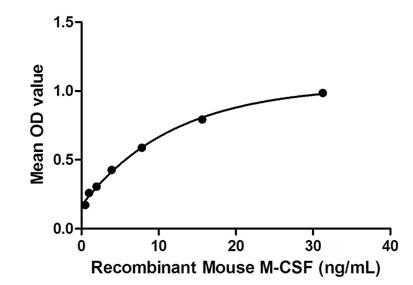Active Colony Stimulating Factor 1, Macrophage (MCSF)
CSF1; M-CSF; Lanimostim; Processed macrophage colony-stimulating factor 1
- Product No.UAPA090Mu61
- Organism SpeciesMus musculus (Mouse) Same name, Different species.
- Buffer FormulationPBS, pH7.4, containing 0.01% SKL, 1mM DTT, 5% Trehalose and Proclin300.
- TraitsFreeze-dried powder
- Purity> 95%
- Isoelectric Point5.1
- ApplicationsCell culture; Activity Assays.
- Download Instruction Manual
- UOM 10µg50µg 200µg 1mg 5mg
-
FOB
US$ 131
For more details, please contact local distributors!US$ 328
For more details, please contact local distributors! US$ 655
For more details, please contact local distributors! US$ 1965
For more details, please contact local distributors! US$ 4913
For more details, please contact local distributors!
ACTIVITY TEST of the Active Colony Stimulating Factor 1, Macrophage (MCSF)


Macrophage Colony Stimulating Factor (M-CSF), also known as CSF-1, is a secreted cytokine which influences hematopoietic stem cells to differentiate into macrophages or other related cell types. M-CSF (or CSF-1) is a hematopoietic growth factor that is involved in the proliferation, differentiation, and survival of monocytes, macrophages, and bone marrow progenitor cells. It can also affects macrophages and monocytes in several ways, including stimulating increased phagocytic and chemotactic activity, and increased tumour cell cytotoxicity. The role of M-CSF is not only restricted to the monocyte/macrophage cell lineage. By
interacting with its membrane receptor (CSF-1R or M-CSF-R encoded by the c-fms proto-oncogene), M-CSF also modulates the proliferation of earlier hematopoietic progenitors and influence numerous physiological processes involved in immunology, metabolism, fertility and pregnancy. Besides, Colony Stimulating Factor Receptor, Macrophage (M-CSF-R) has been identified as an interactor of M-CSF, thus a binding ELISA assay was conducted to detect the interaction of recombinant mouse M-CSF and recombinant mouse M-CSF-R. Briefly, M-CSF were diluted serially in PBS, with 0.01% BSA (pH 7.4). Duplicate samples of 100µL were then transferred to M-CSF-R coated microtiter wells and incubated for 2h at 37℃. Wells were washed with PBST and incubated for 1h with anti-M-CSF pAb, then aspirated and washed 3 times. After incubation with HRP labelled secondary antibody, wells were aspirated and washed 3 times. With the addition of substrate solution, wells were incubated 15-25 minutes at 37℃. Finally, add 50µL stop solution to the wells and read at 450nm immediately. The binding activity of M-CSF and M-CSF-R was shown in Figure 1, and this effect was in a dose dependent manner.
Figure 1. The binding activity of M-CSF with M-CSF-R.
USAGE of the Active Colony Stimulating Factor 1, Macrophage (MCSF)
Reconstitute in 10mM PBS (pH7.4) to a concentration of 0.1-1.0 mg/mL. Do not vortex.
STORAGE of the Active Colony Stimulating Factor 1, Macrophage (MCSF)
Avoid repeated freeze/thaw cycles. Store at 2-8°C for one month. Aliquot and store at -80°C for 12 months.
STABILITY of the Active Colony Stimulating Factor 1, Macrophage (MCSF)
The thermal stability is described by the loss rate. The loss rate was determined by accelerated thermal degradation test, that is, incubate the protein at 37°C for 48h, and no obvious degradation and precipitation were observed. The loss rate is less than 5% within the expiration date under appropriate storage condition.
INCREMENT SERVICES
BCA Protein Quantification Kit
Molecular Mass Marker for Protein
Monoclonal Antibody Customized Service
Polyclonal Antibody Customized Service
Protein Activity Test Experiment Service
Electrophoretic Mobility Shift Assay (EMSA) Experiment Service
Buffer
Lentivirus Packaging Experiment Service
Adenovirus Packaging Experiment Service
Real Time PCR Experimental Service
Spike RBD Protein (S-RBD)
Protein G
Protein A



